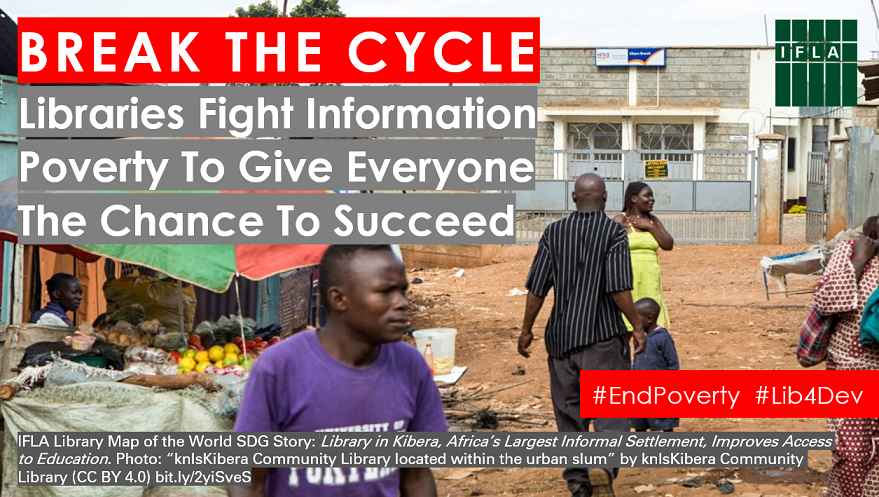
Poverty is complex. While it is often measured in simple income terms (i.e. a household is living on less than 60% of the national median or a fixed sum), its roots – and effective responses to it – have many dimensions.
For example, poverty is often associated with poor health, with the relationship going both directions.
Those living on little money may not be able to eat well, if at all. They may not be able to afford healthcare to deal with simple conditions early. But in turn, people in poor health will find it more difficult to find work or earn a living, and face higher expenses for drugs or treatment.
The same can go with poor housing or criminality for example. Bad conditions make it more difficult for people to find work or other sources of income. But then, low income can make it harder to find a place to leave, and increase the risk of being drawn into crime.
Information Poverty and Income Poverty: A Vicious Circle
Access to information is a particular concern for libraries. Too often, income poverty goes hand in hand with information poverty.
Information poverty has been defined as the ‘situation in which individuals and communities, within a given context, do not have the requisite skills, abilities or material means to obtain efficient access to information, interpret it and apply it appropriately. It is further characterized by a lack of essential information and a poorly developed information infrastructure’.
Just as with health, housing or criminality, the relationship between information poverty and income poverty also risks going both ways.
People without the money to buy internet connections or hardware, without access to means to develop the skills to make use of information, without the perspectives to want to go further will suffer from information poverty.
Yet when people lack access to information, they are cut off from possibilities to adopt new technologies, to innovate, and simply to take better decisions for themselves and those around them.
This can condemn people to information poverty.
Breaking the Cycle: The Role of Libraries
The mission of libraries is to fight against this – to break the link, and rather ensure that information is part of the solution to poverty, not part of the problem.
Access to information opens up opportunities, and supports people in improving their lives. And unlike hand-outs or top-down policies, it also empowers people to find their own paths.
Much of IFLA’s work on development has focused on this contribution, notably in the 2017 Development and Access to Information report, produced in partnership with the Technology and Social Change Group at the University of Washington.
There are examples of how libraries are helping small farmers adopt new techniques which boost productivity, of people in rural Indonesia receiving vital health advice, and of women in Chile being able to find out about employment and bustiness opportunities.
Libraries, as neutral, welcoming centres can also be particularly well placed to reach out to people who may feel unwanted in a commercial setting, or afraid to visit more formal public buildings.
Through providing information – and the spaces and skills to understand and use it comfortably – they are helping to break the link between information poverty and income poverty.
The fight to eradicate poverty will need to be as complex as poverty itself. Yet access to information clearly has a major role to play in this effort.
Libraries, as a key part of any country’s or community’s information infrastructure, are already hard at work.
* Britz, Johannes J. (2004), To Know or Not To Know: A Moral Reflection on Information Poverty, Journal of Information Science, Vol 30, Issue 3, pp192-204, https://doi.org/10.1177/0165551504044666